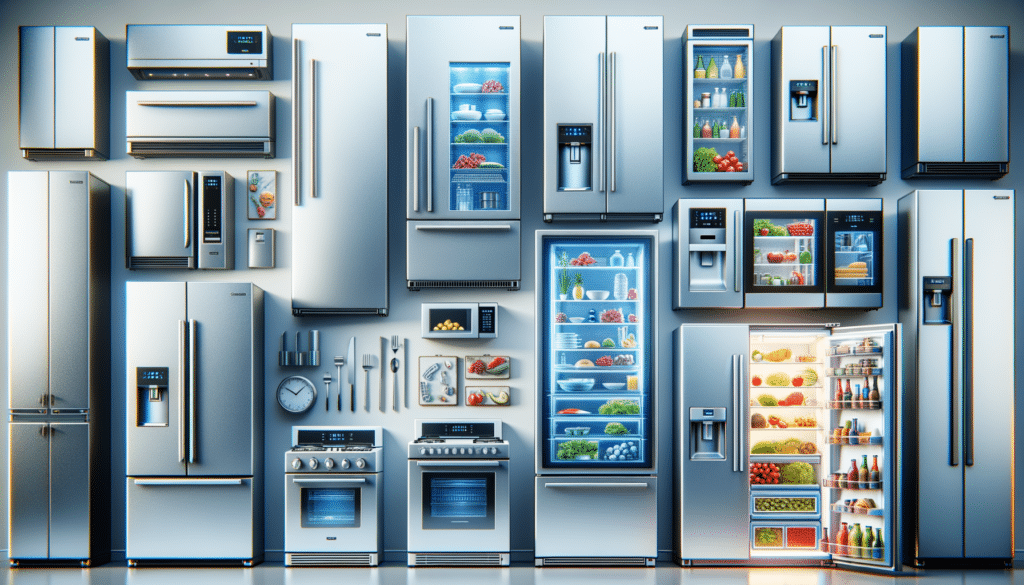Refrigerator: The Heart of Every Kitchen
Refrigerators have become indispensable in modern kitchens, serving as the primary appliance for food preservation. They work by maintaining a cool environment that slows down the growth of bacteria, thus extending the shelf life of perishable items. The evolution of refrigerators over the years has seen a shift from iceboxes to sophisticated appliances equipped with advanced technologies. Modern refrigerators are designed with energy efficiency in mind, often featuring Energy Star ratings that help reduce electricity consumption. They come in various styles, including top-freezer, bottom-freezer, side-by-side, and French door models, each catering to different preferences and kitchen layouts.
When choosing a refrigerator, several factors should be considered:
- Size and Capacity: Ensure it fits the kitchen space and meets the household’s storage needs.
- Energy Efficiency: Look for models with high energy ratings to save on utility bills.
- Features: Consider additional features like ice makers, water dispensers, and smart technology integration.
- Budget: Balance between desired features and affordability.
Refrigerators have also embraced smart technology, allowing users to control settings via smartphone apps, receive alerts about the door being left open, and even check the contents remotely. This integration of technology not only enhances convenience but also ensures better food management, reducing waste. With a focus on sustainability, many manufacturers are now using eco-friendly refrigerants and recyclable materials, contributing to a greener environment.
Commercial Refrigerators: Essential for Business Operations
Commercial refrigerators are crucial for businesses in the food industry, including restaurants, supermarkets, and catering services. These appliances are designed to handle larger volumes of food and beverages, maintaining consistent temperatures to ensure safety and quality. Unlike residential refrigerators, commercial units are built for durability and efficiency, often featuring stainless steel exteriors that are easy to clean and resist wear and tear.
Key considerations for commercial refrigerators include:
- Capacity: Must accommodate the business’s inventory needs.
- Temperature Control: Precise control to meet food safety regulations.
- Energy Efficiency: High energy consumption can impact operational costs.
- Design: Options include reach-in, walk-in, and under-counter models.
The choice of a commercial refrigerator can significantly impact a business’s efficiency and customer satisfaction. For instance, walk-in refrigerators provide ample space for bulk storage, ideal for large-scale operations. On the other hand, reach-in refrigerators offer quick access, suitable for busy kitchens. As businesses strive to meet health codes and standards, having reliable refrigeration is paramount. Moreover, advancements in commercial refrigeration technology have led to the development of models with enhanced insulation and smart monitoring systems, ensuring optimal performance and reduced energy consumption.
Freezers: Preserving Freshness for Longer
Freezers play a vital role in food preservation, allowing individuals and businesses to store food for extended periods. By maintaining temperatures below freezing, they halt the growth of bacteria and slow down enzymatic reactions that cause spoilage. Freezers come in various types, including upright, chest, and drawer freezers, each offering unique advantages.
When selecting a freezer, consider the following:
- Space: Ensure it fits the designated area and provides adequate storage.
- Energy Usage: Opt for energy-efficient models to minimize electricity costs.
- Defrosting Method: Manual defrost vs. automatic defrost options.
- Storage Needs: Consider the type of items to be stored and the required capacity.
Chest freezers are renowned for their energy efficiency and capacity, making them ideal for storing bulk items. However, they require more floor space and can be challenging to organize. Upright freezers, on the other hand, offer easier access and organization with shelves and compartments, though they may consume more energy. Modern freezers also incorporate features like fast-freeze settings, which rapidly lower the temperature to preserve the quality of fresh food.
In both residential and commercial settings, freezers are crucial for reducing food waste and managing inventory effectively. With the increasing focus on sustainability, many manufacturers are developing freezers with eco-friendly refrigerants and improved insulation, contributing to energy conservation and environmental protection.

